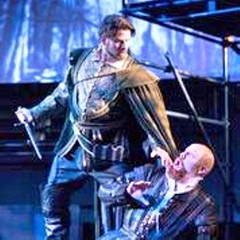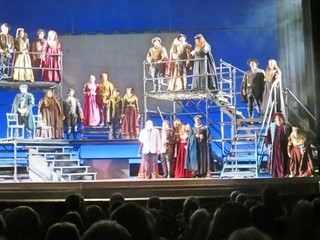|
Back
Whether Tis Nobler In The Music.... Philadelphia
Wilmington, DE (The Grand Opera House)
05/14/2016 - & May 20, 22, 2016
Franco Faccio: Amleto
Joshua Kohl (Amleto), Sarah Asmar (Ofelia), Lara Tilotson (Geltrude), Timothy Mix (Claudio), Ben Wager (Lo Spettro), Matthew Vickers (Laerte), Harold Wilson (Polonio), Justin Hopkins (Orazio), José Saćin (Marcello, Un Sacerdote), Douglas Rowland (Herald), James Haughom (Il Re Gonzaga), Marcelle McGuirk (La Regina), Ben Wagter (Luciano), Harold Wilson (Primo Becchino), First State Ballet Theater (Dancers), Lauren Frere, Ethan Hunter Raysor, Jake Nowicki, Mary Kate Reynolds (Solo Dancers)
OperaDelaware Chorus, Jeffrey Miller (OperaDelaware Music Director, Chorus Master), OperaDelaware Orchestra, Anthony Barrese (Conductor)
E. Loren Meeker (Stage Director), Peter Tupitza (Set Designer), Jay Delp Productions (Audio Visuals), Howard Tsvi Kaplan (Costume Designer)

J. Kohl, T. Mix (© Joe del Tufo/Moonloop Photography)
Some stories can be translated into opera. But never Hamlet. Not even Arrigo Boito, whose librettos of Otello and Falstaff were so brilliant, could do much more than boil down the ingredients, kill off the speeches, get rid of the characters (yes, Rosenkrantz and Guildenstern were dead), and turn Shakespeare’s greatest, most enigmatic, mysterious, still unsolvable mystery play into a mid-19th Century Italian melodrama. A Rigoletto without any arias even a shadow’s worth of La donna e mobile.
Which never stopped Verdi’s favorite conductor, Franco Faccio, with trying his hand at composing this opera. His offering of Amleto never succeeded in his own time for various reasons. Nor did anybody ever classify it as a great opera by Verdian standards. Yet if he failed in making a classic, Amleto was always waiting to be discovered. Which is exactly what conductor Anthony Barrese went about doing some years ago.
From a blurred microfilm of the original score, taken down with scholarly exactitude by Mr. Barrese, to a concert production in Baltimore and a staged premiere in Albuquerque two years ago, Amleto was seen as an interesting novelty. Perhaps it had the underpinnings of great opera, but Franco Faccio never had the melodic inspiration of Verdi. Nothing hummable, nothing exciting (save for an excellent last scene), opportunities galore, but opportunities inevitably missed.
Now enter the 71-year-old OperaDelaware and its personable young director Brendan Cooke. OperaDelaware, whose venue is in Wilmington’s gorgeous old Grand Lodge of the Masons with its terrific acoustics, was set to make a breakthrough. And by coincidence, that Masonic Hall was built in 1871, the same year that the last production of Amleto was played at La Scala.
Thus it was a natural fit to stage it here, to put OperaDelaware on the East Coast Map. With his friend Anthony Barrese, the man who reincarnated the opera, General Director Cooke created this year’s Shakespeare Festival (Amleto, Verdi’s Falstaff and an evening of Shakespeare in song), used a small local orchestra (41 players, the size of provincial Italian orchestra), local dancers and chorus, singers from around America–and Amleto made its East Coast Premiere last Saturday evening to huzzahs and bravoes from the almost-full audience.
For this writer, it was a chance to see Wilmington, take a bus to the charming 300-year-old section of New Castle–and then see what Amleto was all about.
To repeat, this was almost good early Verdi, though Verdi without the genius. And it was advantageous trying to forget that this was Shakespeare at all. Gone was the eeriest of all openings with the Ghost of Hamlet’s father. (”Swear!! Swear!!!”) Instead we opened with spectacle, a Traviata-style grand ballroom with dancers, drinkers and a choruses. Instead of To Be or Not To Be as an almighty aria, Faccio wrote us a quasi-recitative. Rather than a chattering Polonius, we had a minor character whose death meant nothing.
And instead of The Melancholy Dane, Boito gave us, from the beginning, a mad frenetic prince, whose first words were about love for Ophelia, whose meeting with his father’s ghost, and screen projection, evaporated to a slow ending with his friends. The so-important “Players Scene” was turned into “the Singers Scene”, and that ominous dumb-show simply had more semi-arias.
Plot-wise, this was less Hamlet than a histrionic Il folle principe e il re (”The Crazy Prince And the King).
And yet...and yet, without holding the mirror up to (Shakespeare’s) nature, OperaDelaware managed to hold a mirror up to the raucous joy of early 19th Century opera itself. What this company gave to Amleto was a zest, a youthfulness, a series with all the signposts of the genre. Okay, so that ballroom scene was hardly Elizabethan. But the crowds of dancers, singers, soloists who massed onto the relatively small stage, were talented, enthusiastic, gave their all to the songs and ballets. One could hardly spot Hamlet fretting amidst the crowds, and even Claudio was staggering amidst the extras. But who cared?
Where Boito created a new Falstaff and Otello, here, the young librettist truncated the lines, set up the exposition in the first three minutes and then presented a parade of (frankly mediocre) arias, choruses, love duets, three orchestral entr’actes, with the only notable music a long, really thrilling final scene.
Yet Stage Director E.Loren Meeker created movements that were swift, usually reasonable (save for one horrible piece of direction, where Ophelia enters suicidal and mad, and Laertes and friends sympathize and then virtually “tally-ho” off stage for more adventures), and never lagging.

Cast at fnale (© Samuel A. Dog)
The set was practical and excellent: A series of metal lattices upon which cast could climb, dangle and dance. A bed or an arras were set up as necessary, but the abstractions served their purposes.
The stage directions, then, were as broad as the libretto. The voices were as Italianate as American voices can be. Joshua Kohl’s energetic tenor went along with his almost frantic physical energy. Timothy Mix had a fine low voice, though hardly as menacing as Claudio was meant to be. Sarah Asmar was supposedly ailing before the show, though one couldn’t spot that. And her movements before drowning were very telling.
Boito cut the wondrous speeches of the ghost to almost nothing, but Ben Wager played the spectre with enough portent. As for pure acting prowess, nobody was better than Harold Wilson, a drunken gravedigger who had all the mordant dark humor and dark character which Boito’s libretto lacked.
Yet this is trifling. I don’t imagine–and I don’t think Anthony Baresse could imagine–that this would ever become a staple of the operatic stage, here or in Italy. But for OperaDelaware, Amleto showed just how inventive an opera company can be, even without the cachets of the Metropolitan or Chicago.
Giving the dusty manuscript of Amleto some “too too solid flesh” was more than a gamble for Brendan Cooke. Everybody I spoke to in Wilmington, whether opera-lover or not, was enthusiastic when his name came up, and with Amleto, the plaudits were well earned.
The irony was that Franco Faccio’s weakness served another purpose. The following afternoon OperaDelaware presented Falstaff–and Verdi’s final masterpiece sounded more brilliant than ever.
More on that tomorrow. Let’s just say that in the truncated Amleto, no Fortinbras was around at the end to rescue the state of Denmark. Everybody died, yes. But before that death, they put as much life as possible into the remnants of Shakespeare’s great drama.
Harry Rolnick
|